“Harriet” (2019). Cast: Cynthia Erivo, Leslie Odom Jr., Janelle Monáe, Joe Alwyn, Clarke Peters, Vanessa Bell Calloway, Omar J. Dorsey, Henry Hunter Hall, Tim Guinee, Zackary Momoh, Vondie Curtis-Hall, Jennifer Nettles, Deborah Ayorinde, Michael Marunde, Rakeem Laws, Tory Kittles. Director: Kasi Lemmons. Screenplay: Gregory Allen Howard and Kasi Lemmons. Story: Gregory Allen Howard. Web site. Trailer.
The American dream of living a life of freedom is as old as the days of the Founding Fathers. Yet, for many years after the Revolution and the establishment of the new republic, one segment of society was always left out when it came to enjoying such self-evident blessings. The nation’s slave population languished in an unending cycle of forced servitude, unable to break free – except, of course, for a few courageous souls who defied the odds and escaped their circumstances. The inspiring story of one enslaved woman who did just that – and then went on to help many others suffering similar circumstances – provides the basis for the new historic biopic, “Harriet.”
In Dorchester County, Maryland in 1849, 27-year-old Araminta “Minty” Ross (Cynthia Erivo) lives the life of a slave on the plantation of Edward Brodess (Michael Marunde). Having been born into slavery as the daughter of her mother, Rit (Vanessa Bell Calloway), it’s the only life she’s ever known. However, she now seeks to change that by pleading her case for freedom, based on a pledge made by Mr. Brodess’s grandfather, who promised Rit that she (and her offspring) would be freed from their forced servitude upon reaching a certain age, a milestone that has long since passed. What’s more, Minty has recently married a free black man, John Tubman (Zackary Momoh), with whom she’d like to share the legal liberation he enjoys, something they could also pass on to any children that they might have.
[caption id="attachment_11101" align="aligncenter" width="350"]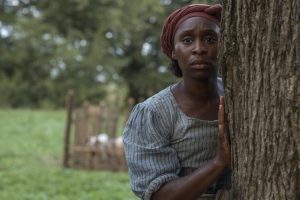 Araminta “Minty” Ross (a.k.a. Harriet Tubman) (Cynthia Erivo) seeks freedom from forced servitude by running away from her slave master in the inspiring new biopic, “Harriet.” Photo by Glenn Wilson, courtesy of Focus Features.[/caption]
Araminta “Minty” Ross (a.k.a. Harriet Tubman) (Cynthia Erivo) seeks freedom from forced servitude by running away from her slave master in the inspiring new biopic, “Harriet.” Photo by Glenn Wilson, courtesy of Focus Features.[/caption]
After making their case to Edward with the assistance of Minty’s father, Ben (Clarke Peters), also a free black man, Minty and John are summarily turned down. Brodess flatly says he has no intention of honoring his grandfather’s agreement and that Minty, like her mother, will forever remain a slave, despite his ancestor’s pledge and despite her marriage to a free man.
Needless to say, Minty is dejected. But she is also resolute to seek her freedom, contending that it’s immoral for a person to own another human being. The path to such a result is sure to be difficult, but she’s committed to find it one way or another, no matter what it takes.
Shortly thereafter, however, Minty’s plan runs into a major hurdle: Edward dies unexpectedly, leaving his wife, Eliza (Jennifer Nettles), and son, Gideon (Joe Alwyn), with a pile of unpaid debts. Also, given that the farm is not faring as well as expected, the surviving Brodesses are faced with having to raise cash to stay afloat, an objective they hope to achieve by selling off some of their “assets,” namely, slaves like Minty for whom they believe they’ll be able to fetch a good price. Minty is terrified at the prospect, believing that she’ll be sold off and sent down South, keeping her from seeing John and her family members ever again. With such a possibility looming, she decides to run.
[caption id="attachment_11102" align="aligncenter" width="350"]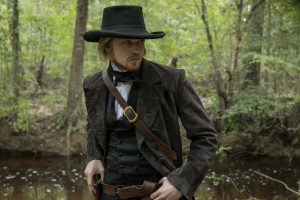 Slave owner Gideon Brodess (Joe Alwyn) seeks to recover his runaway “property” in director Kasi Lemmons’s enlightening new biopic, “Harriet.” Photo by Glenn Wilson, courtesy of Focus Features.[/caption]
Slave owner Gideon Brodess (Joe Alwyn) seeks to recover his runaway “property” in director Kasi Lemmons’s enlightening new biopic, “Harriet.” Photo by Glenn Wilson, courtesy of Focus Features.[/caption]
Minty meets with her pastor, Rev. Samuel Green (Vondie Curtis-Hall), for guidance. Rev. Green proves to be surprisingly helpful, given that he usually preaches sermons encouraging his parishioners to work hard, remain contrite and obey their slave masters. He instructs Minty to head north to Pennsylvania, a free state in which she can lead a comparatively less restricted life as a free black. In particular, he advises her to head to Philadelphia, an oasis for free blacks and escaped slaves, and to contact the head of the Pennsylvania Anti-Slavery Society, William Still (Leslie Odom Jr.), who can help her make a new life for herself. But, first, she has to get there, an arduous 100-mile journey filled with peril, pursuers and many hardships, all to be accomplished on foot, mostly at night, through the wilderness.
Despite the odds, Minty succeeds in her journey, reaching Philadelphia and meeting Mr. Still. He subsequently introduces her to Marie Buchanon (Janelle Monáe), a free black woman who owns a boarding house for escaped slaves. Marie gives her residents a place to stay and food to eat, as well as assistance in finding paid employment, something Minty has never experienced. She quietly settles into her new life as a free person.
In addition to providing help with everyday considerations, Mr. Still also keeps detailed records about the lives and experiences of the escapees. He chronicles their lives and their paths to freedom, compiling a sort of data base about his constituents. In taking down Minty’s information, he learns that she suffered a severe head injury in her youth, one that subsequently prompted her to have “visions” and vivid dreams, episodes that she believes are communications with God. Mr. Still is somewhat skeptical, chalking up her descriptions of these events to possible brain damage. But Minty is convinced it’s divine inspiration, something that she claims has helped guide her more than a few times, especially during her flight to freedom. She considers this ability a valuable gift for living, one she will come to draw upon many times as she moves forward in life.
[caption id="attachment_11103" align="aligncenter" width="350"]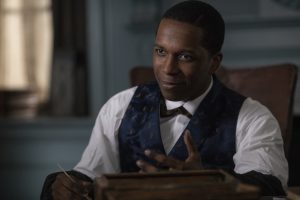 William Still (Leslie Odom Jr.), head of the Pennsylvania Anti-Slavery Society, helps escaped slaves adjust to a life of freedom in Philadelphia in “Harriet.” Photo by Glenn Wilson, courtesy of Focus Features.[/caption]
William Still (Leslie Odom Jr.), head of the Pennsylvania Anti-Slavery Society, helps escaped slaves adjust to a life of freedom in Philadelphia in “Harriet.” Photo by Glenn Wilson, courtesy of Focus Features.[/caption]
Of course, no new beginning would be complete without some kind of gesture to signify its inception. To that end, Mr. Still asks Minty if she would like to take a new name for herself, one of her choosing that suits her desires and celebrates her freedom (and that can help to conceal her true identity from hunters tracking down runaway slaves). She thus chooses one that’s a combination of her mother’s birth name and her own married name. And it’s with that Harriet Tubman is born.
After about a year, though, Harriet finds herself lonely, longing to be with her husband John. She contemplates going back to Maryland to retrieve him so that they can live together in freedom, a plan Mr. Still strongly discourages, due to the dangers involved. He warns her that aggrieved slave owners, like her own former master Gideon Brodess, are growing more aggressive in their efforts to recover their “property,” hiring opportunistic free black bounty hunters like Bigger Long (Omar J. Dorsey) and informants like a shady character named Walter (Henry Hunter Hall) to assist them. However, being resolved to be with John, Harriet forges ahead with her plan, successfully making her way back to Dorchester County.
Unfortunately, upon arrival, Harriet receives some distressing news: Having heard stories that she was killed during her flight to freedom, John believed that she was dead. He subsequently remarried. And, with his new wife now expecting, he can’t bring himself to leave.
[caption id="attachment_11104" align="aligncenter" width="350"]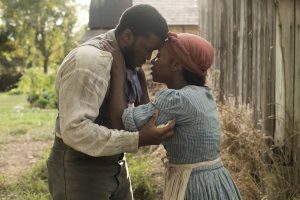 Araminta “Minty” Ross (a.k.a. Harriet Tubman) (Cynthia Erivo, right) hopes to create a life of freedom for herself and her husband, John (Zackary Momoh, left), in the new historic biopic, “Harriet.” Photo by Glenn Wilson, courtesy of Focus Features.[/caption]
Araminta “Minty” Ross (a.k.a. Harriet Tubman) (Cynthia Erivo, right) hopes to create a life of freedom for herself and her husband, John (Zackary Momoh, left), in the new historic biopic, “Harriet.” Photo by Glenn Wilson, courtesy of Focus Features.[/caption]
Though devastated by this revelation, Harriet comes to a startling realization: Events have unfolded as they have because God must have summoned her to a higher calling, that of helping others escape and shepherding them to freedom. She thus decides to help a group of family members make their flight north, a venture in which she succeeds without losing a single soul.
Harriet’s efforts impress Mr. Still so much that he recommends her to become a member of the Underground Railroad, a covert network of “conductors” who help slaves escape captivity by stealthily leading them from one clandestine “station” (i.e., safe house) to another from the American South to the northern U.S. or southern Canada. It was an effort that earned Harriet her legacy as one of the greatest heroes in American history.
Harriet never would have achieved what she did, however, were it not for her indefatigable fearlessness. Even as far back as her days as a slave under the elder Mr. Brodess, she possessed an unshakable courage to attain what she considered just and right, a conviction that helped make her dream possible. But, then, that comes with the territory when someone holds steadfastly to such potent beliefs, the building blocks of the conscious creation process, the philosophy that maintains we draw upon these powerful tools in manifesting the reality we experience.
[caption id="attachment_11105" align="aligncenter" width="350"]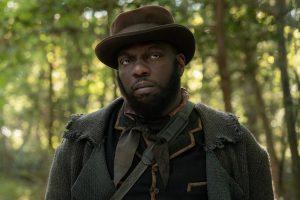 Bounty hunter Bigger Long (Omar J. Dorsey) seeks his fortune by assisting slave masters in capturing runaways in “Harriet.” Photo by Glenn Wilson, courtesy of Focus Features.[/caption]
Bounty hunter Bigger Long (Omar J. Dorsey) seeks his fortune by assisting slave masters in capturing runaways in “Harriet.” Photo by Glenn Wilson, courtesy of Focus Features.[/caption]
In witnessing Harriet’s odyssey, it’s no surprise that she was able to realize her aspirations. Her journey may not have always been an easy one, but, given her steely resolve, it always resulted in the outcome she sought. Whether it was freedom for herself or her family or for the more than 70 slaves whose lives she helped change, she held tight to her vision and let her beliefs be her guide.
But, as important as living courageously was to this effort, it was not the only belief that Harriet drew upon. She also had an unswerving adherence to the principles of individual freedom and the abolition of forced servitude. This idealism, fortified by a hefty infusion of personal integrity, drove her forward in her efforts, making their realization possible. She firmly believed in her views – and herself – a virtually unbeatable combination when it came to the manifestation of her initiatives.
Of course, Harriet was not “alone” when it came to formulating her plans and strategies. She had (or believed she had) divine inspiration on her side to guide her. Whether Harriet was actually speaking to God is open to speculation, but the concept of receiving enlightened guidance is certainly not in doubt. As conscious creators are well aware, we all have access to our intuition in the belief formation process, that indefinable, feeling-based knowing in whose validity we have absolute faith, no matter how unusual it may seem, and that plays a crucial role in the shaping of the thoughts, beliefs and intents we hold. Such intuitional access is what Harriet may well have had at her disposal, even if she didn’t recognize it as such or call it by that name. What’s most important, though, is that she trusted it implicitly, convinced that it would never steer her wrong. And the result is that such reliance served to bolster her confidence in her manifesting beliefs, making it eminently more possible to deliver to her the results she sought.
[caption id="attachment_11106" align="aligncenter" width="350"]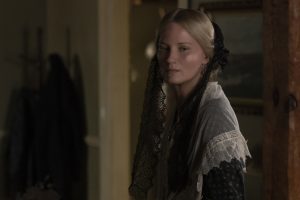 Widow Eliza Brodess (Jennifer Nettles) worries about the future of her plantation after her deceased husband leaves her with a pile on unpaid debts in the new historic biopic, “Harriet.” Photo by Glenn Wilson, courtesy of Focus Features.[/caption]
Widow Eliza Brodess (Jennifer Nettles) worries about the future of her plantation after her deceased husband leaves her with a pile on unpaid debts in the new historic biopic, “Harriet.” Photo by Glenn Wilson, courtesy of Focus Features.[/caption]
More than anything else, though, Harriet’s convictions made it possible for her to live out her value fulfillment, the conscious creation concept associated with us being our best, truest selves for the betterment of ourselves and those around us. Given Harriet’s track record, it’s easy to see that she was doing what she was destined to do. Her actions certainly benefitted herself and her family, but they also led to better lives for the many people she helped. The world is certainly a better place – even today – for having had someone like Harriet as part of its history, culture and legacy, someone who epitomized value fulfillment in one of its most inspired embodiments.
While the storytelling approach employed in “Harriet” is rather safe and formulaic, director Kasi Lemmons’s heroic biopic nevertheless delivers an inspiring tale of a courageous soul who successfully helped liberate an oppressed people. Erivo delivers a knock-out, award-worthy performance as the celebrated title character, backed by a fine ensemble cast of supporting players, all placed within a fine period piece production design. Admittedly the dialogue is a tad preachy at times, and the film’s overdramatic soundtrack frequently overpowers the mood of many scenes. However, for those seeking uplifting viewing options, especially those that would appeal to impressionable young women, this tribute to Harriet Tubman is well worth the time.
Despite its many fine attributes, “Harriet” has come under attack for some of its historical accuracy. However, viewers must remember that this is a biopic, a film based on historical events, not a literal documentation of the character’s life and times. What’s more, given that some aspects of Harriet’s life are difficult to pinpoint, some gaps had to be filled in with speculation about what may have been true. And it’s on those points that the picture makes some educated guesses, some plausible, some less likely. Those interested in this subject should check out an excellent Slate magazine article by Rachelle Hampton, available by clicking here.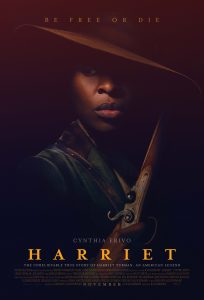
The hunger for freedom is one that’s difficult to satisfy, especially when it’s being starved of sustenance. But it’s under circumstances like that when we’re most motivated to keep persevering to obtain what we seek. Harriet’s story provides us with a shining example of what to do and how to proceed when we have nothing left to lose – and everything to gain.
Copyright © 2019, by Brent Marchant. All rights reserved.
Sunday, November 17, 2019
‘Harriet’ chronicles a historic fight for freedom
Subscribe to:
Post Comments (Atom)

No comments:
Post a Comment